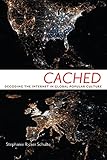Cached : Decoding the Internet in Global Popular Culture / Stephanie Ricker Schulte.
Material type: TextSeries: Critical Cultural Communication ; 23Publisher: New York, NY : New York University Press, [2013]Copyright date: ©2013Description: 1 online resource : 2 black and white illustrationsContent type:
TextSeries: Critical Cultural Communication ; 23Publisher: New York, NY : New York University Press, [2013]Copyright date: ©2013Description: 1 online resource : 2 black and white illustrationsContent type: - 9780814708668
- 9780814788684
- 302.231 23
- HM851 .S34 2016
- online - DeGruyter
| Item type | Current library | Call number | URL | Status | Notes | Barcode | |
|---|---|---|---|---|---|---|---|
 eBook
eBook
|
Biblioteca "Angelicum" Pont. Univ. S.Tommaso d'Aquino Nuvola online | online - DeGruyter (Browse shelf(Opens below)) | Online access | Not for loan (Accesso limitato) | Accesso per gli utenti autorizzati / Access for authorized users | (dgr)9780814788684 |
Browsing Biblioteca "Angelicum" Pont. Univ. S.Tommaso d'Aquino shelves, Shelving location: Nuvola online Close shelf browser (Hides shelf browser)

|

|

|

|

|

|

|
||
| online - DeGruyter Unhitched : Love, Marriage, and Family Values from West Hollywood to Western China / | online - DeGruyter Soundbitten : The Perils of Media-Centered Political Activism / | online - DeGruyter All You That Labor : Religion and Ethics in the Living Wage Movement / | online - DeGruyter Cached : Decoding the Internet in Global Popular Culture / | online - DeGruyter Economic Policy and Household Welfare During Crisis and Adjustment in Tanzania / | online - DeGruyter Trade and Investment in the 1990s : Experts Debate Japan--U.S. Issues / | online - DeGruyter Literature and the Relational Self / |
restricted access online access with authorization star
http://purl.org/coar/access_right/c_16ec
"This is the most culturally sophisticated history of the Internet yet written. We can't make sense of what the Internet means in our lives without reading Schulte's elegant account of what the Internet has meant at various points in the past 30 years."-Siva Vaidhyanathan, Chair of the Department of Media Studies at The University of VirginiaIn the 1980s and 1990s, the internet became a major player in the global economy and a revolutionary component of everyday life for much of the United States and the world. It offered users new ways to relate to one another, to share their lives, and to spend their time-shopping, working, learning, and even taking political or social action. Policymakers and news media attempted-and often struggled-to make sense of the emergence and expansion of this new technology. They imagined the internet in conflicting terms: as a toy for teenagers, a national security threat, a new democratic frontier, an information superhighway, a virtual reality, and a framework for promoting globalization and revolution.Schulte maintains that contested concepts had material consequences and helped shape not just our sense of the internet, but the development of the technology itself. Cached focuses on how people imagine and relate to technology, delving into the political and cultural debates that produced the internet as a core technology able to revise economics, politics, and culture, as well as to alter lived experience. Schulte illustrates the conflicting and indirect ways in which culture and policy combined to produce this transformative technology.
Mode of access: Internet via World Wide Web.
In English.
Description based on online resource; title from PDF title page (publisher's Web site, viewed 01. Nov 2023)


